What is a therapy dog?
Research has shown that owning a dog has been associated with the following physical and mental health benefits: reduced blood pressure, reduced anxiety, increased self-esteem, improved mood, increased likelihood of outdoor exercises, and decreased loneliness. For more details check out this article HERE. Given the countless health benefits associated with owning a dog it is no wonder why they are used for pet therapy!
Therapy dogs work in a variety of different settings and help people with numerous conditions. Among the amazing tasks therapy dogs can do include the following:
Helping children read
Providing comfort to patients and families in oncology and hospice units
Decreasing anxiety for children awaiting surgery or during medical procedures
Helping medical staff cope with stress
Reduce stress among college students during midterms and finals week
Provide emotional support for grieving families
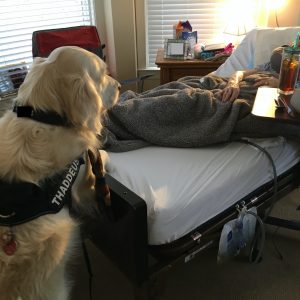
Paging doctor Thaddeus! Photo credit: Thaddeus’s mom, Meribeth.
What are the differences between a therapy dog and a service dog?
A service dog is paired with someone to assist them with a specific activity or condition. For example, service dogs may be paired with someone who is blind, has seizure disorders, caridac conditions, arthritis, ALS, cerebral palsy, and Parkinson’s disease to name a few. Service dogs are allowed in public spaces where pets and therapy dogs are not permitted (such as planes and restaurants. Service dogs stay with their person all day every day. To learn more about service dogs visit HERE.
Interview with Thaddeus the Therapy Dog
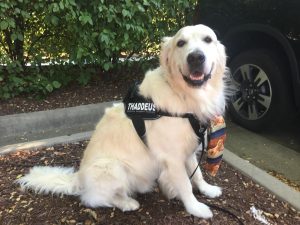
Thaddeus ready for work! Photo credit: Thaddeus’s mom, Meribeth.
Thaddeus was gracious enough to provide his input regarding questions that pups and their hoomans want to know about the pet therapy world! He provided thorough answers to all my questions. Imagine how hard it was to type all his answers with paws! if that isn’t dedication, then I don’t know what is! to his field! Keep reading for the inside scoop from Thaddeus!
Thaddeus is a wealth of information about pet therapy and life in general! Not only has he touched the lives of everyone he has met, but he also has a pawsitive impact on many dogs that have come through the NRGRR. His mother, Meribeth says Thaddeus is an excellent brother to the foster siblings that come into his home. His mother says he is good at helping dogs learn to be dogs. He teaches other dogs by showing them how to play, setting healthy boundaries, and modeling manners. I can attest to the fact that to meet Thaddeus is to fall in love with him! I’m so thankful to Thaddeus’s parents who have nurtured him and have contributed to much to Neuse River Golden Retriever Rescue!
How did you get started on the road to becoming a therapy dog?
My mom found so much comfort when therapy dogs came to visit her dad in a hospice facility so she knew that her next dog would need the right temperament to become a therapy dog. She started off as my foster mom, but of course, she adopted me in like a millisecond!
We could not go through certification until 6 months after my adoption so we spent that time taking classes to get to know each other and build trust.
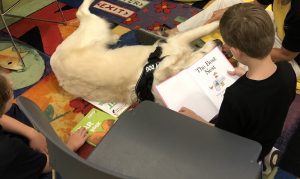
Thaddeus helping kids read. Photo credit: Thaddeus’s mom, Meribeth.
What traits do you need to be a good therapy dog?
Mom says I was born to be a therapy dog because I’m quiet, gentle, and calm well, most of the time! Whenever she puts on my work harness I know I’m going to work! I love all people. I accept pets, hugs, and being touched all over. Other good therapy traits I have are that I get along well with other dogs. I also know to stay next to my mom and not jump.
Also, loud noises, new smells, and medical equpiment don’t bother me. Once when I was on a visit there was a medical emergency. Alarms were sounding off and people were racing by wth equipment. I knew I had to sit quietly by the wall with my mom to stay out of the way.
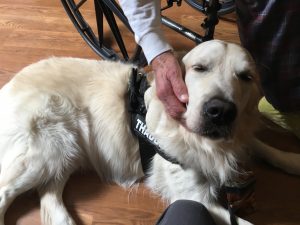
Thaddeus doing what he does best. Photo credit: Thaddeus’s mom, Meribeth.
How did you get your certification to become a therapy dog?
Since my Mom was already a hospice volunteer, we went through the certification organization they recommended, which is the Alliance of Therapy Dogs. After 6 months of obedience and therapy dog group classes, we worked with a trainer specifically on acclimating to a medical setting.
Of course, I did great but the trainer said it was mom who really needed the training! Once mom finally got it together, we applied to take the therapy dog test which first required a background check and providing veterinary records including rabies vaccination.
The first round of testing was a handling test, similar to the Canine Good Citizen test. Mom was sweating the loose leash walk test but I aced it so we moved onto the next phase. This required 4 separate observation visits in medical settings. This part of the test was where I could show my superpower to provide comfort!
I am always the star of each visit but mom needed to know the rules so it took both of us to pass! To keep up with our annual certification, Mom needs to take a written test, provide documentation of our visits, and my veterinarian submits a form.
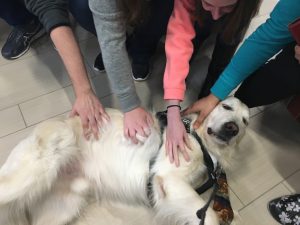
Thaddeus providing some stress relief during college exams week! Photo credit: Thaddeus’s mom, Meribeth.
What was the hardest part of getting your pet therapy certification?
It was easy for me but my mom was nervous about the handler’s skills! Now that we are a therapy dog team, I will confess that getting my nails done every Sunday and all the bathing and grooming required is my least favorite part but I love when people say how nice I smell and ask what kind of conditioner I use to have such silky fur – so it’s worth it!
Do you get excited to go to work? How is your behavior different in a work setting?
I’m a normal dog who gets the zoomies and jumps on people and steals napkins from time to time. However, I’ve learned that when my special Therapy Dog Harness goes on, I am going to work! My job is to be calm and follow mom’s lead.
After work, I always get an awesome treat! We often swing by Unleashed where I choose a new toy or treat. Once that harness comes off – well, stand back ‘cuz I’ve been calm for the last few hours and I’m ready to run wide open!
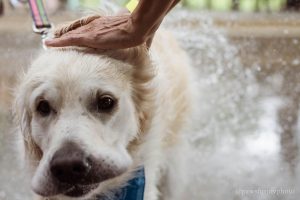
Thaddeus at Neuse River Golden Retriever Rescue Spring Swim.
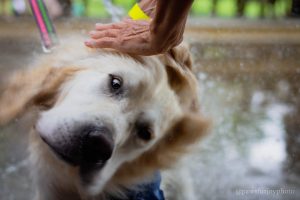
Neuse River Golden Retriever Recue Spring Swim
How has covid-19 impacted your work?
I’m out of pet therapy work for the foreseeable future. I miss my weekly Hospice visits, my last therapy session was in March. We have also missed all sorts of fun events: college exam week, library visits, and health fairs. The silver lining is that mom seems to forget to give me baths and do my nails on a set schedule!
Do you belong to an organization that does pet therapy?
We are certified through the Alliance of Therapy Dogs. Before Covid-19, we visited patients in a hospice facility every Sunday. I also went to assisted living facilities and home visits as requested. We belong to a local therapy dog group, Retrieving Hearts. Along with team members, we have visited the Ronald McDonald House, fund-raising events, and the Durham County Library’s program, Read to a Therapy Dog!
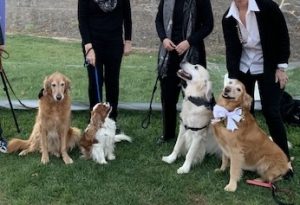
Thaddeus dressed to impress at the Angus Barn Ronald McDonald House Gala! Photo credit: Thaddeus’s mom, Meribeth.
What do you like to do in your spare time?
As a Neuse River Golden Retriever Rescue dog, I am eternally grateful to this amazing group of dedicated volunteers and love to participate in events held throughout a [normal] year! Oh, and I will say that I am an awesome foster brother and like to help fellow NRGRR foster dogs. They sometimes come for doggie daycare and sometimes they spend a few days. I go on a walk with them and I help them get comfortable around people and dogs.
And for fun before Covid, I was working on visiting every NC State Park. I’ve been to 37 out of the 42 parks in the NC State Park Passport! I also enjoyed increasing my collection of 30 brewery coasters … looking forward to starting where I left off someday!
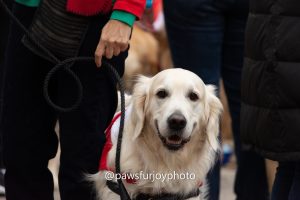
Raleigh Christmas parade 2019
Tell me about your NRGRR adoption story Thaddeus.
When my Mom & Dad lost their last 2 NRGRR goldens, they started fostering again. They were fostering an 85 pound, 1-year-old who was terrified of everything! I came along to show them all what to do! I had my foster brother going to dog classes and breweries in no time! Oh and fun fact, I was born in Romania and flown over here as a pup but I don’t speak any Romanian.
What do people say about your impact on them?
Often, the patients I visit will tell me all about the dogs they have had. It is such a privilege to share a happy memory with them. Sometimes, I’m there to brighten the staff’s day, and sometimes I’m there for the family. You never know how a visit is going to go; we try to be there for whatever level of interaction is helpful.
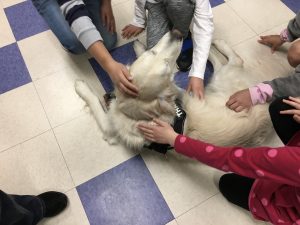
Thaddeus loves visiting elementary schools! Photo credit: Thaddeus’s mom, Meribeth.
Is there anything else you want people to know?
You can follow my adventures on Instagram @thaddeus_nrgrr_dog
Pet Therapy Resources
National Pet Therapy Dog Associations
Check out this comprehensive list of nationally recognized therapy dog organizations compiled by the AKC HERE.
Alliance of Therapy Dogs is a great resource for therapy dogs and their handlers as well as aspiring therapy dogs!
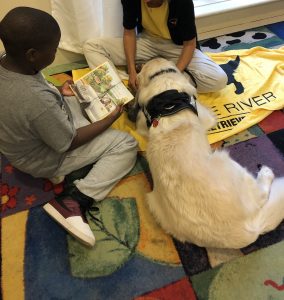
Thaddeus helping children read. Photo credit: Thaddeus’s mom, Meribeth.
Therapy Dog Programs in the Triangle
Below is a list of programs in the Raleigh area that provide therapy dog services (or training). However please keep in mind that many of these organizations have suspended operations in the wake of covid-19.
Animal Assisted Therapy of the Triangle is a counseling group that has therapy animals as part of the session. They provide individual couples and family therapy. They not only have therapy dogs but cats too!
Retrieving Hearts
Pet Pals NC is geared toward using Animal Assisted therapy to serve children in K-12 chools to promote academic, social, behavioral, and emotional growth.
Check out Retrieving Hearts! This is the group that Thaddeus belongs to. This group was even featured on Ellen, how cool is that?
Rex hospital and Duke have dog therapy teams!
Helping Paws International provides animal-assisted therapy with greyhounds. They are based in Raleigh, NC.
North Carolina Pet Partners is another great pet therapy program based in the Triangle area!
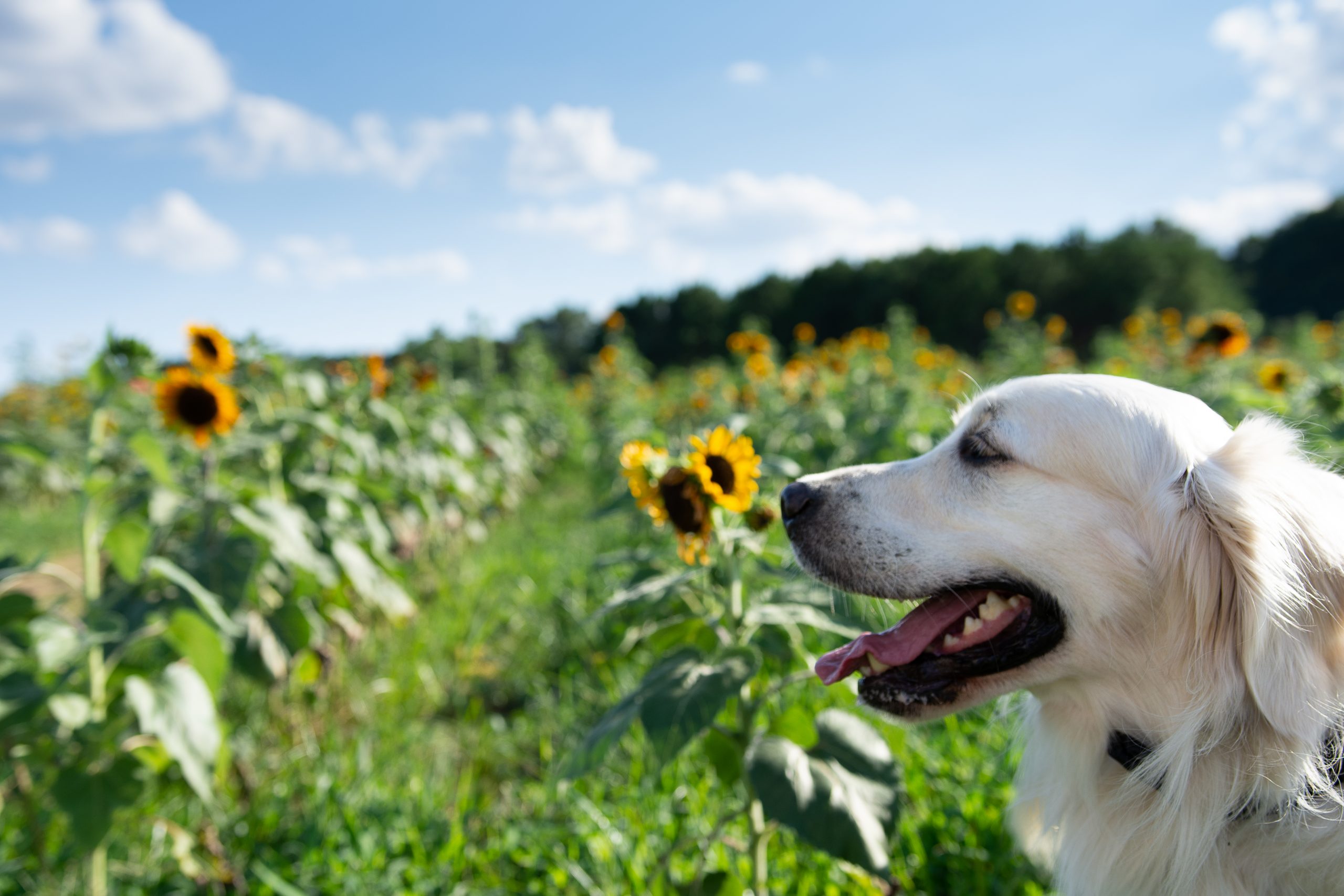
Thank you Abby for letting me share my story and providing great references! Some photos were taken by Retrieving Hearts founder, Catherine Guy. – – ???? Thaddeus
You are so welcome Thaddeus! Thank YOU for everything you do! Thanks for the photo info. I’ll update the captions!